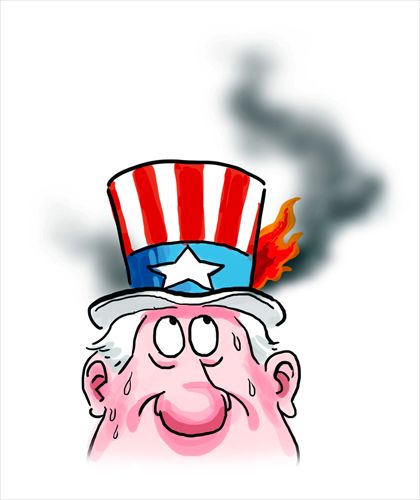 Fan Bingbing's "Queen style" in new play
Fan Bingbing's "Queen style" in new play
 Yanxi Lake: Venue for APEC China 2014
Yanxi Lake: Venue for APEC China 2014
 Top 10 pricey destinations for studying abroad
Top 10 pricey destinations for studying abroad
 Couple chase tornados to create perfect storm photos
Couple chase tornados to create perfect storm photos
 J-10 fighters show aerobatic stunts in smog-free sky
J-10 fighters show aerobatic stunts in smog-free sky
 Top 10 charming female soldiers of the PLA
Top 10 charming female soldiers of the PLA
 Charming contestants of Shanghai Int’l Model Contest
Charming contestants of Shanghai Int’l Model Contest
 Most amazing chi-pao beauties
Most amazing chi-pao beauties
 7 deadly animal attacks
7 deadly animal attacks
 Picturesque autumn scenery of Hongshan Army Horse Ranch
Picturesque autumn scenery of Hongshan Army Horse Ranch

Illustration: Liu Rui/GT
All through 2014, the grey hair of US President Barack Obama and his anxious facial expression are showing the world that his ability cannot meet his ambitions. The US has been losing the ability to control the world order.
Domestically, the shooting of Michael Brown that occurred on August 9 in Ferguson, Missouri, left the latest "scar" in the US human rights history.
The whole of US society has been thinking: Why are such tragedies still taking place?
Many Americans always believe that this case that touched upon where the Americans most feel vulnerable about - racism and racial conflicts - was merely caused by several accidental factors.
According to them, the first factor was the abuse of power by the police.
The second was that the people involved were a mix of different races.
In the Brown case, if the policeman was a black or Brown was white, there wouldn't have been large-scale protests and violence.
Last but not the least, all kinds of political forces helped intensify the issue, leaving the first African-American president stuck in between.
But if the US public believes what led to the Brown tragedy were merely these accidental factors, then they haven't had a clear understanding of the US' own human rights crisis.
The Americans have the illusion that US-style concepts of human rights are a universal value and a parameter to measure the human rights affairs of other countries, but they have forgotten their own scars.
In 1857 in the Dred Scott v. Sandford case, the US Supreme Court made a landmark decision that African-Americans were not citizens and could not bring suit in federal court.
In 1954, the Brown v. Board of Education case served as the blasting fuse of the civil rights movement.
The Civil Rights Act of 1964 outlawed discrimination based on race. However, in daily life African-Americans still have to face the white society purposely distancing from them and they have no choice but to resort to violence.
The US human rights record, especially the racial issue as a time bomb, is not as pretty as we have imagined.
The Brown case is far from accidental, but reflects a deeply-rooted crisis.
Even Obama admitted at the UN that "at times we too have failed to live up to our ideals" and that "America has plenty of problems within our own borders."
The Brown case reminds us that there is no civil rights movement that takes place once and for all, nor will there be lasting human rights values.
If a country is so arrogant that it becomes conservative and complacent, its concept of human rights is bound to break away from its protection of human rights, and it will be stuck in a human rights crisis as a result.
The Brown case, a shameful part in the US human rights history, will not be the last one.
The author is an associate professor at the School of Administrative Law, Southwest University of Political Science and Law. opinion@globaltimes.com.cn
 Century-old public bath closes door in Beijing
Century-old public bath closes door in Beijing A post-80s girl's tale of two cities
A post-80s girl's tale of two cities Shocking! Photos of Chinese fighters revealed
Shocking! Photos of Chinese fighters revealed World's most intimidating nuclear weapons
World's most intimidating nuclear weapons Standard faces for each countries
Standard faces for each countries Netizens fall in love with champion swimmer Ning Zetao
Netizens fall in love with champion swimmer Ning Zetao Vibrant 21-year-old and her own Cheongsam brand
Vibrant 21-year-old and her own Cheongsam brand Fashion style: Faye Wong vs Cecilia Cheung
Fashion style: Faye Wong vs Cecilia Cheung Leading director Wang Quan'an detained for 'buying sex'
Leading director Wang Quan'an detained for 'buying sex' Top 10 handsome football players
Top 10 handsome football players  Top 10 Chinese goddesses
Top 10 Chinese goddesses  Top 20 hottest women in the world in 2014
Top 20 hottest women in the world in 2014 Top 10 fifth generation jet fighters in the world
Top 10 fifth generation jet fighters in the world Top 10 pure beauties in showbiz
Top 10 pure beauties in showbiz  Top 10 world's highest-paid models 2014
Top 10 world's highest-paid models 2014 The most gorgeous Chinese women
The most gorgeous Chinese women Top 10 most handsome faces in Asia
Top 10 most handsome faces in AsiaDay|Week|Month